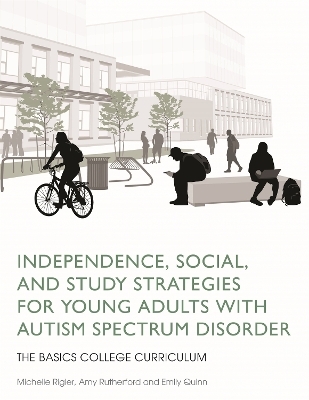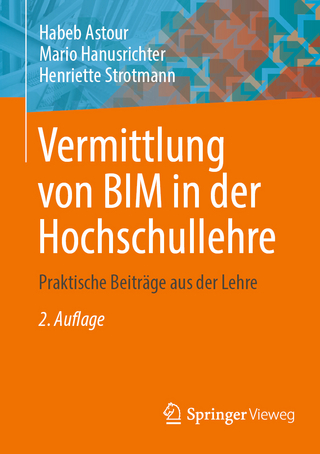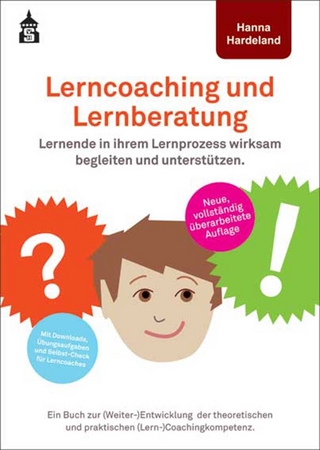
Independence, Social, and Study Strategies for Young Adults with Autism Spectrum Disorder
Jessica Kingsley Publishers (Verlag)
978-1-84905-787-5 (ISBN)
The BASICS College Curriculum presents a hands-on approach to learning essential life and study skills for college students with Autism Spectrum Disorder (ASD). This book focuses on the transition to college, developing key academic skills, navigating campus social life, and living away from home for the first time.
Ideal as a textbook for ASD college programs run by disability support services and suitable for students to use for self-study, it teaches independence skills, self-advocacy, organization, stress management, and social skills. Each lesson provides valuable information and advice for the student, useful diagrams, practical exercises and workbook components that can be filled in at home or in class, and self-assessment tools.
Michelle Rigler, EdD, is Director of the Disability Resource Center at The University of Tennessee at Chattanooga. She created and runs their MoSAIC Program for Students with Autism Spectrum Disorder. Having completed a Master's Degree in Special Education and worked for a number of years as a special education teacher, she embarked on a career in Higher Education in 2004 and received a Doctorate in Education in Learning and Leadership. Amy Rutherford is Program Coordinator for the Disability Resource Center's MoSAIC Program for Students with Autism Spectrum Disorder at the University of Tennessee at Chattanooga. She has a Master's Degree in Mental Health Counseling with a focus on Autism Spectrum Disorders. Emily Quinn is Access Coordinator for the Disability Resource Center and serves in the role of coach and instructor for the MoSAIC Program for Students with Autism Spectrum Disorder at the University of Tennessee at Chattanooga. She is currently pursuing a Master's Degree in Special Education.
Acknowledgments. Introduction. 1. Transitions. Lesson 1: Life Skills Development. Lesson 2: Self-Advocacy. Lesson 3: Understanding Autism Spectrum Disorders. 2. Organization in Academics. Lesson 1: Planning Systems. Lesson 2: Managing Time and Assignments. Lesson 3: Setting Goals. 3. Communication in Academics. Lesson 1: Using a Syllabus. Lesson 2: Monitor your Progress. Lesson 3: Academic Communication. 4. Organization in Life. Lesson 1: Medical Health. Lesson 2: Daily Habits. Lesson 3: Self-Care. Lesson 4: Know Your Resources. 5. Communication in Personal Life. Lesson 1: Active Communication. Lesson 2: Sharing the Conversation. Lesson 3: Personal Space and Tone of Voice. 6. Stress Management. Lesson 1: Symptoms and Triggers of Stress. Lesson 2: Stress to Anger: Controlling your Emotional Response. Lesson 3: Coping Strategies to Reduce Stress. Lesson 4: Know your Resources. 7. Personal Responsibility in Academics. Lesson 1: Attendance. Lesson 2: Out-of-Class Assignments. Lesson 3: Group Work. Lesson 4: Study Habits. Lesson 5: Major/Work/Career. 8. Campus Social Life. Lesson 1: The Campus Social Structure. Lesson 2: Learning Opportunities. Lesson 3: Balancing It All. 9. Relationships. Lesson 1: Defining Relationships. Lesson 2: Recognizing Relationship Levels. Lesson 3: Sexuality and Gender Identity. Lesson 4: Non-Optional Social Compliance. Next Steps. Appendix A – BASICS Chart Student Example. Appendix B - Guided Discussion. References.
| Erscheint lt. Verlag | 21.11.2014 |
|---|---|
| Reihe/Serie | The BASICS College Curriculum |
| Zusatzinfo | 16 black and white |
| Verlagsort | London |
| Sprache | englisch |
| Maße | 215 x 279 mm |
| Gewicht | 598 g |
| Themenwelt | Sozialwissenschaften ► Pädagogik ► Erwachsenenbildung |
| Sozialwissenschaften ► Pädagogik ► Sonder-, Heil- und Förderpädagogik | |
| ISBN-10 | 1-84905-787-7 / 1849057877 |
| ISBN-13 | 978-1-84905-787-5 / 9781849057875 |
| Zustand | Neuware |
| Haben Sie eine Frage zum Produkt? |
aus dem Bereich


